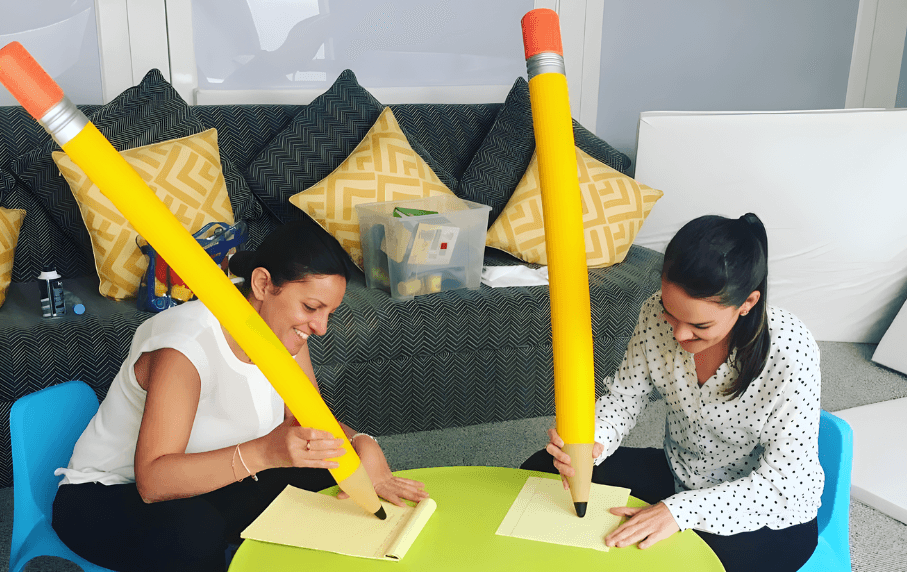
It’s quite incredible what silence can offer. As therapists and teachers, we are trained to both listen and to speak with impeccability. We are taught to be aware of not just what we are saying but also how we are saying it and to be good role models for those we teach.
In my years of being a therapist and mentor, I am constantly learning from my students. My most recent, and perhaps one of the most profound lessons for me, came from a boy named AP, a little 4-year-old with Autism.
We have been working together now for over a year and I am part of a team of early intervention providers. We use a developmental-behavioural approach and most of our time together is fun, filled with play-based learning and incorporating his interests and strengths. At least that is what I thought we were all doing but, AP had a lesson to share with me… we are not always doing what we think we are doing.
By his behaviour that day, he reminded me that, although I was incorporating his interests, I was afraid of the silence and wasn’t really listening to him and allowing sufficient opportunities for him to just “be”. Most of the time, he’s having to listen to me, the other therapy team members, his teachers and caregivers. He is given things to play with and do. He has a scheduled day from when he wakes up to when he sleeps.
Yesterday, he had gotten upset over an activity that I “pushed him” to complete. He is an amazing little reader and I was asking him to match sentences to pictures. I knew he could do it and wanted to see him succeed. That therapist ego can certainly get in the way!
He started to cry, and he pushed all the cards away and went to the chair and continued to cry. I let him sit and cry (so as not reinforce his crying) but stayed close by. After less than a minute (which felt much longer, it was 46 seconds) he stopped crying and looked up at me. Normally, I would have him go back finish the task and then let him do a something of his choice. Yesterday, I didn’t. I stopped too.
I then got a toy out that I know he likes and offered it to him nonverbally. As I sat by him, I asked myself what was I doing wrong that was causing this? And recalled one of my first mentors Dr Jim Partington telling me, “If a child doesn’t learn the way we are teaching them, then we need change the way we are teaching”.
As I sat silently and allowed little AP to make some play choices for himself, he settled. I handed him the missing pieces for him to complete his coloured pegboard and he took each one from me, slowly and deliberately, one at a time. Each time he did, he looked at me and I smiled as I handed them to him.
Normally I would narrate what he was doing, “Taking the pink one”, “Making an umbrella”, “Putting in”, but this time I didn’t. I was silent. Not only silent with my words but also silent with my thoughts.
We both settled into this silent exchange. I realized that, although I was listening to his spoken language, I wasn’t really listening to his needs. It’s easy to want to be results-driven as therapists and to push for more goals to be achieved in order to help the children we work with in succeeding and growing but, little AP had a very important to lesson to teach me. Silence is also sacred, and silence also speaks to us.
When I let him sit and choose, he showed me what he was thinking, what he was needing, and what he could do. He really just wanted me to be present and available, and in doing so, I was able to really evaluate how his therapy sessions were being managed and the changes needed. When I emptied my mind of what I thought he should be doing and what I should be doing, the emptiness offered me solutions and alternative viewpoints.
Interestingly, the Divine Name that came up for me today during my daily meditation and reading was Al Mujib. This is the Name or Divine attribute that represents the art of Sacred Listening. The meaning of Al Mujib in English is, The One Who Responds, the One who both Hears and Responds with great attentiveness.
The human heart is capable of reflecting these Divine attributes. In the practice of Listening to the One we ask from, and emptying what’s in our hearts, we are able to experience and witness the silence of Presence. This is the energy of creation and creativity, and so, thanks to little AP, I experienced this beautiful lesson in my everyday/working life where it was needed most.